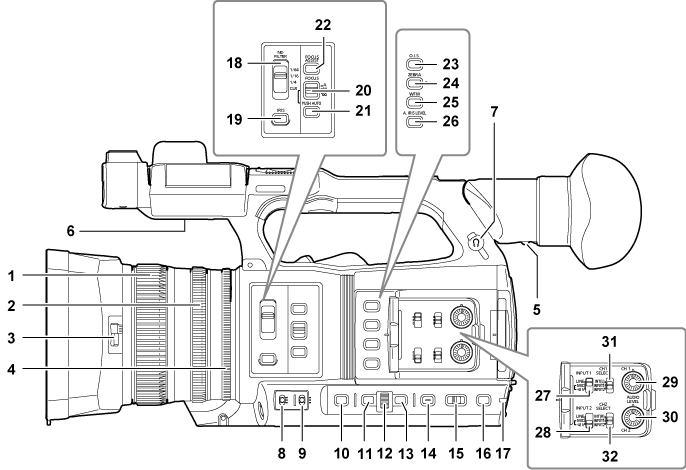- Top
- Description of Parts
- Camera
- Right side
Right side

Focus ring
Manually focuses when the <FOCUS> switch is set to <M>.
Zoom ring
Manually adjusts the zoom lens.
Lens cover switching lever
Opens/closes the lens cover.
Iris ring
Adjusts the lens iris manually when the manual iris is set with the <IRIS> button.
Diopter adjustment lever
Adjusts the diopter scale so that the viewfinder screen can be viewed clearly.
Built-in speaker
Outputs audio during playback.
Audio is not output from the built-in speaker when headphones are connected to the headphone terminal.
Headphones terminal
Connects audio monitoring headphones.
<GAIN> switch
Switches the brightness of the screen according to the lighting conditions under which you are shooting.
<WHITE BAL> switch
Selects the method for adjustment of the white balance.
<PRST>: Adjusts the white balance to the preset value. [3200K], [5600K], and [VAR] toggle each time the <AWB> button is pressed.
<A>/<B>: Selects when using the stored value for the adjustment of the white balance.
<SHUTTER> button
Toggles the shutter mode.
<MENU> button
Displays the menu. Pressing the <MENU> button while the menu is displayed closes the menu.
Press the button while the thumbnail screen is displayed to display the operation screen of the thumbnail menu, and clips can be deleted.
Multidial
Moves, selects, and sets the menu while the menu is displayed.
Use the multidial to also operate thumbnails, select the multi manual function and select/set the various operation icons.
<EXIT> button
Returns to one level higher when the menu is displayed. Pressing the <EXIT> button without confirming the setting value will not reflect the change in the setting.
<DISP/MODE CHK> button
Displays/hides information other than the time counter, time stamp, zebra pattern, and marker.
Press and hold the button to display information about the settings of the various shooting functions and information such as a list of the functions assigned to the USER button. Each press of the button toggles the information page in order.
<AUTO/MANUAL> switch
Selects the method to adjust the focus, gain, iris, white balance, and shutter speed at shooting. You can set the function to assign to <AUTO> in the [CAMERA] menu → [AUTO SW].
<AUTO>: Adjusts automatically. (Auto mode)
<MANU>: Adjusts manually. (Manual mode)
<SLOT SEL> button/<USER 5> button
Selects the card slot to record to or play back from.
This is also used as the USER button (USER5).
Rear tally lamp
Illuminates when the recording is started. Flashes when the battery level becomes low.
Whether or not to illuminate the lamp can be set in the menu.
<ND FILTER> switch
Selects the ND filter to suit the illumination of the subject.
<CLR>: Does not use the ND filter.
<1/4>: Reduces the amount of light entering the MOS sensor to 1/4.
<1/16>: Reduces the amount of light entering the MOS sensor to 1/16.
<1/64>: Reduces the amount of light entering the MOS sensor to 1/64.
<IRIS> button
Selects the method for adjustment of the lens iris.
<FOCUS> switch
Select the focus function.
<A>: Changes to the auto focus mode. The auto focus mode adjusts the focus automatically.
<M>: Changes to the manual focus mode. Control the focus ring manually to adjust the focus.
<
 >: Changes to the manual focus mode after the focus distance is set to infinity.
>: Changes to the manual focus mode after the focus distance is set to infinity.The <FOCUS> switch is a spring switch. The switch returns to the <M> position even when pushed towards the <
 > side.
> side.<PUSH AUTO> button
Performs automatic focusing while pressing the button during manual focus mode.
<FOCUS ASSIST> button
Enables/disables the focus assist function which is set in the [VIDEO OUT/LCD/VF] menu → [FOCUS ASSIST] → [FOCUS ASSIST SW].
<O.I.S.>/<USER 1> button
Enables/disables the optical image stabilizer function.
This is also used as the USER button (USER1).
<ZEBRA>/<USER 2> button
Displays/hides zebra patterns.
This is also used as the USER button (USER2).
<WFM>/<USER 3> button
Displays/hides the waveform monitor displayed on the LCD monitor.
This is also used as the USER button (USER3).
<A.IRIS.LEVEL>/<USER 4> button
Enables/disables the auto iris level function.
Set the target value of the auto iris level in the [SCENE FILE] menu → [A.IRIS LEVEL EFFECT].
This is also used as the USER button (USER4).
<INPUT1> switch
Switches audio input signals connected to the <AUDIO INPUT 1> terminal.
<LINE>: Select when audio equipment is connected by the line input.
<MIC>: Select when the external microphone is connected.
<+48V>: Select when the external microphone is connected and the microphone needs a power supply.
<INPUT2> switch
Switches audio input signals connected to the <AUDIO INPUT 2> terminal.
<LINE>: Select when audio equipment is connected by the line input.
<MIC>: Select when the external microphone is connected.
<+48V>: Select when the external microphone is connected and the microphone needs a power supply.
<AUDIO LEVEL CH1> dial
Adjust the recording level of audio channel 1.
<AUDIO LEVEL CH2> dial
Adjust the recording level of audio channel 2.
<CH1 SELECT> switch
Selects the audio to be recorded on audio channel 1.
<INT(L)>: Records the left audio of the built-in microphone.
<INPUT1>: Records input signals from the <AUDIO INPUT 1> terminal.
<INPUT2>: Records input signals from the <AUDIO INPUT 2> terminal.
<CH2 SELECT> switch
Selects the audio to be recorded on audio channel 2.
<INT(R)>: Records the right audio of the built-in microphone.
<INPUT1>: Records input signals from the <AUDIO INPUT 1> terminal.
<INPUT2>: Records input signals from the <AUDIO INPUT 2> terminal.